Barriers and Strategies for Organizational Learning in Australia
VerifiedAdded on 2022/12/30
|8
|2045
|34
AI Summary
This essay discusses the barriers and strategies for organizational learning in Australia, including bounded rationality, cultural differences, and work-related obstacles. It also explores the importance of data use, stakeholder engagement, and social learning in creating a learning organization.
Contribute Materials
Your contribution can guide someone’s learning journey. Share your
documents today.
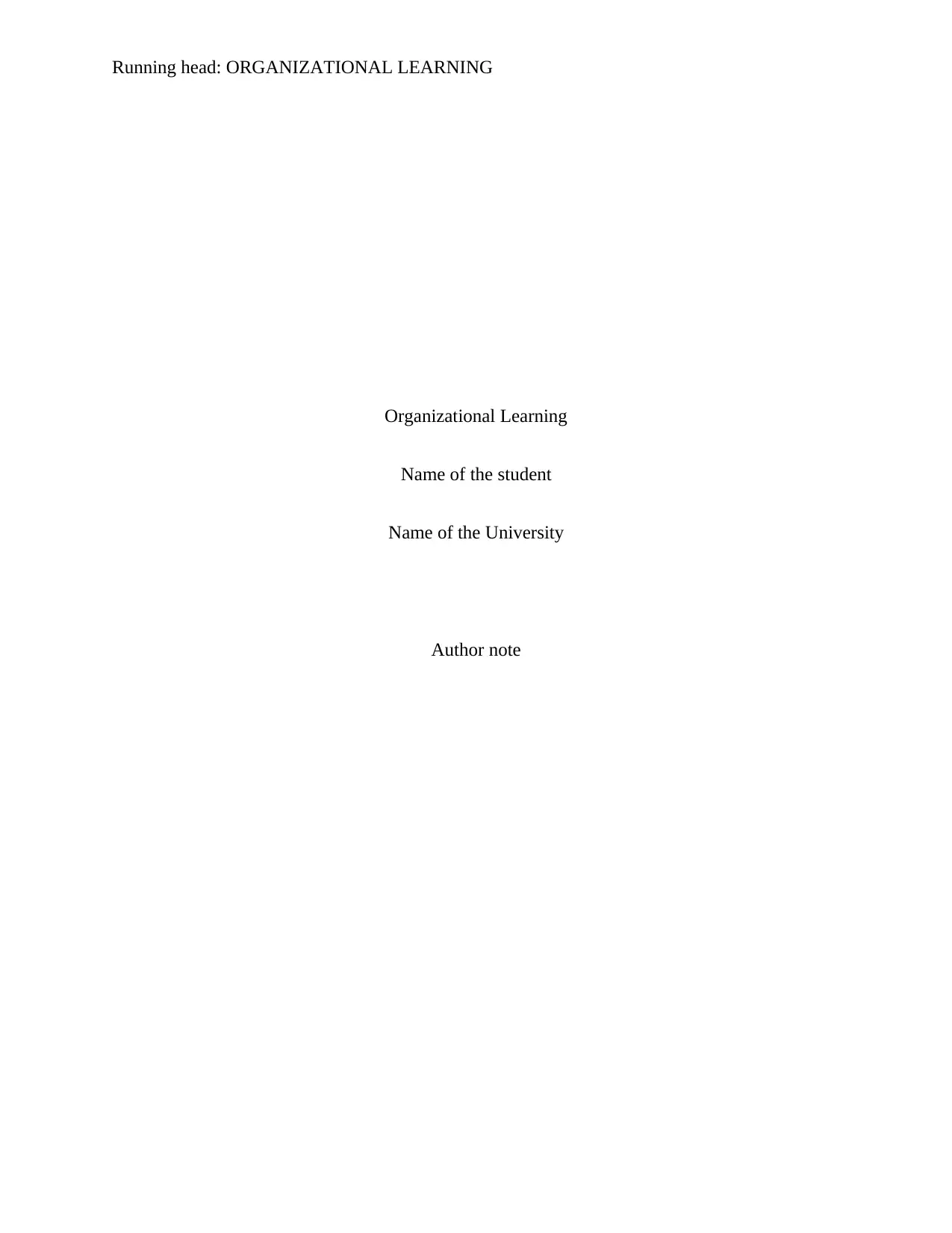
Running head: ORGANIZATIONAL LEARNING
Organizational Learning
Name of the student
Name of the University
Author note
Organizational Learning
Name of the student
Name of the University
Author note
Secure Best Marks with AI Grader
Need help grading? Try our AI Grader for instant feedback on your assignments.
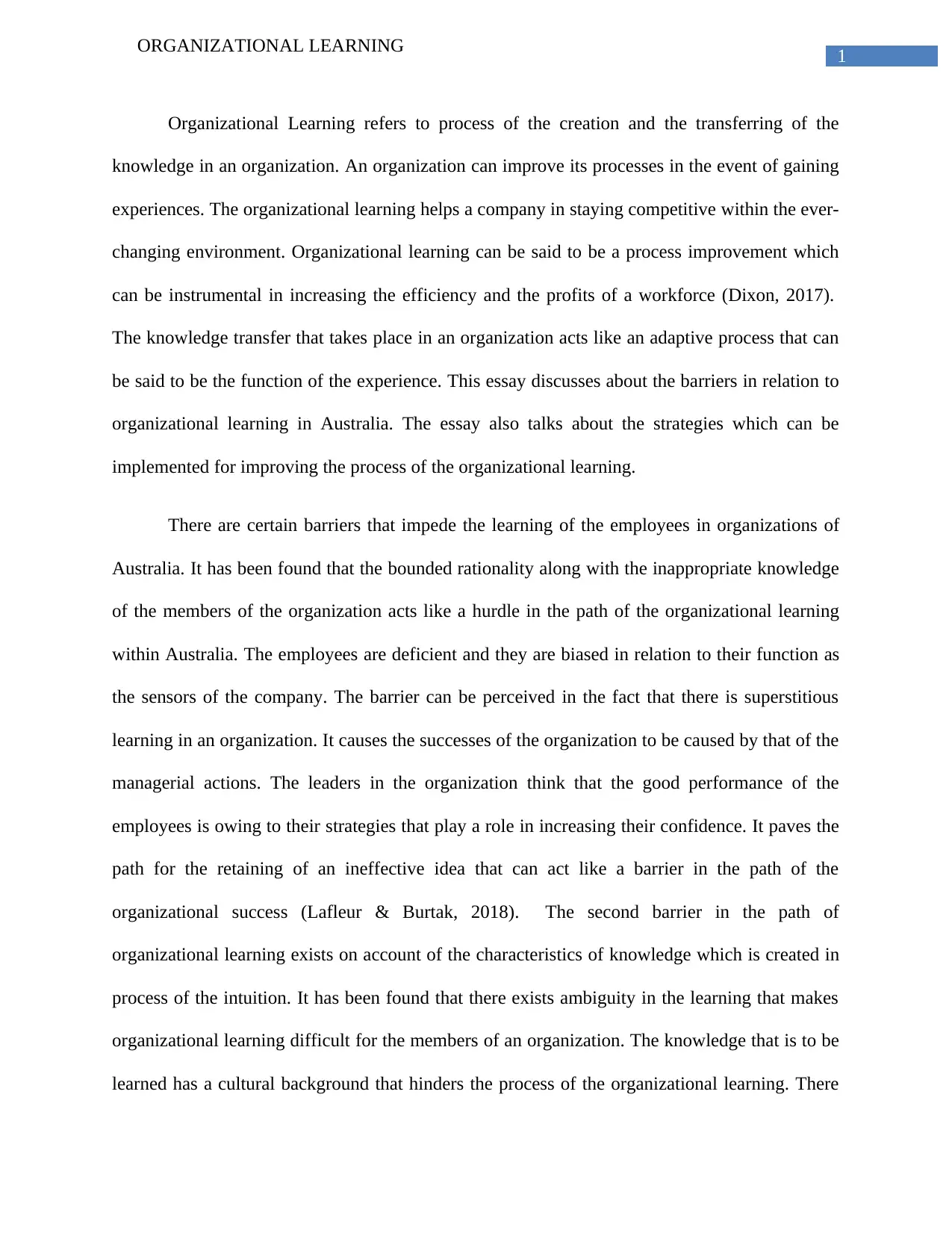
1
ORGANIZATIONAL LEARNING
Organizational Learning refers to process of the creation and the transferring of the
knowledge in an organization. An organization can improve its processes in the event of gaining
experiences. The organizational learning helps a company in staying competitive within the ever-
changing environment. Organizational learning can be said to be a process improvement which
can be instrumental in increasing the efficiency and the profits of a workforce (Dixon, 2017).
The knowledge transfer that takes place in an organization acts like an adaptive process that can
be said to be the function of the experience. This essay discusses about the barriers in relation to
organizational learning in Australia. The essay also talks about the strategies which can be
implemented for improving the process of the organizational learning.
There are certain barriers that impede the learning of the employees in organizations of
Australia. It has been found that the bounded rationality along with the inappropriate knowledge
of the members of the organization acts like a hurdle in the path of the organizational learning
within Australia. The employees are deficient and they are biased in relation to their function as
the sensors of the company. The barrier can be perceived in the fact that there is superstitious
learning in an organization. It causes the successes of the organization to be caused by that of the
managerial actions. The leaders in the organization think that the good performance of the
employees is owing to their strategies that play a role in increasing their confidence. It paves the
path for the retaining of an ineffective idea that can act like a barrier in the path of the
organizational success (Lafleur & Burtak, 2018). The second barrier in the path of
organizational learning exists on account of the characteristics of knowledge which is created in
process of the intuition. It has been found that there exists ambiguity in the learning that makes
organizational learning difficult for the members of an organization. The knowledge that is to be
learned has a cultural background that hinders the process of the organizational learning. There
ORGANIZATIONAL LEARNING
Organizational Learning refers to process of the creation and the transferring of the
knowledge in an organization. An organization can improve its processes in the event of gaining
experiences. The organizational learning helps a company in staying competitive within the ever-
changing environment. Organizational learning can be said to be a process improvement which
can be instrumental in increasing the efficiency and the profits of a workforce (Dixon, 2017).
The knowledge transfer that takes place in an organization acts like an adaptive process that can
be said to be the function of the experience. This essay discusses about the barriers in relation to
organizational learning in Australia. The essay also talks about the strategies which can be
implemented for improving the process of the organizational learning.
There are certain barriers that impede the learning of the employees in organizations of
Australia. It has been found that the bounded rationality along with the inappropriate knowledge
of the members of the organization acts like a hurdle in the path of the organizational learning
within Australia. The employees are deficient and they are biased in relation to their function as
the sensors of the company. The barrier can be perceived in the fact that there is superstitious
learning in an organization. It causes the successes of the organization to be caused by that of the
managerial actions. The leaders in the organization think that the good performance of the
employees is owing to their strategies that play a role in increasing their confidence. It paves the
path for the retaining of an ineffective idea that can act like a barrier in the path of the
organizational success (Lafleur & Burtak, 2018). The second barrier in the path of
organizational learning exists on account of the characteristics of knowledge which is created in
process of the intuition. It has been found that there exists ambiguity in the learning that makes
organizational learning difficult for the members of an organization. The knowledge that is to be
learned has a cultural background that hinders the process of the organizational learning. There
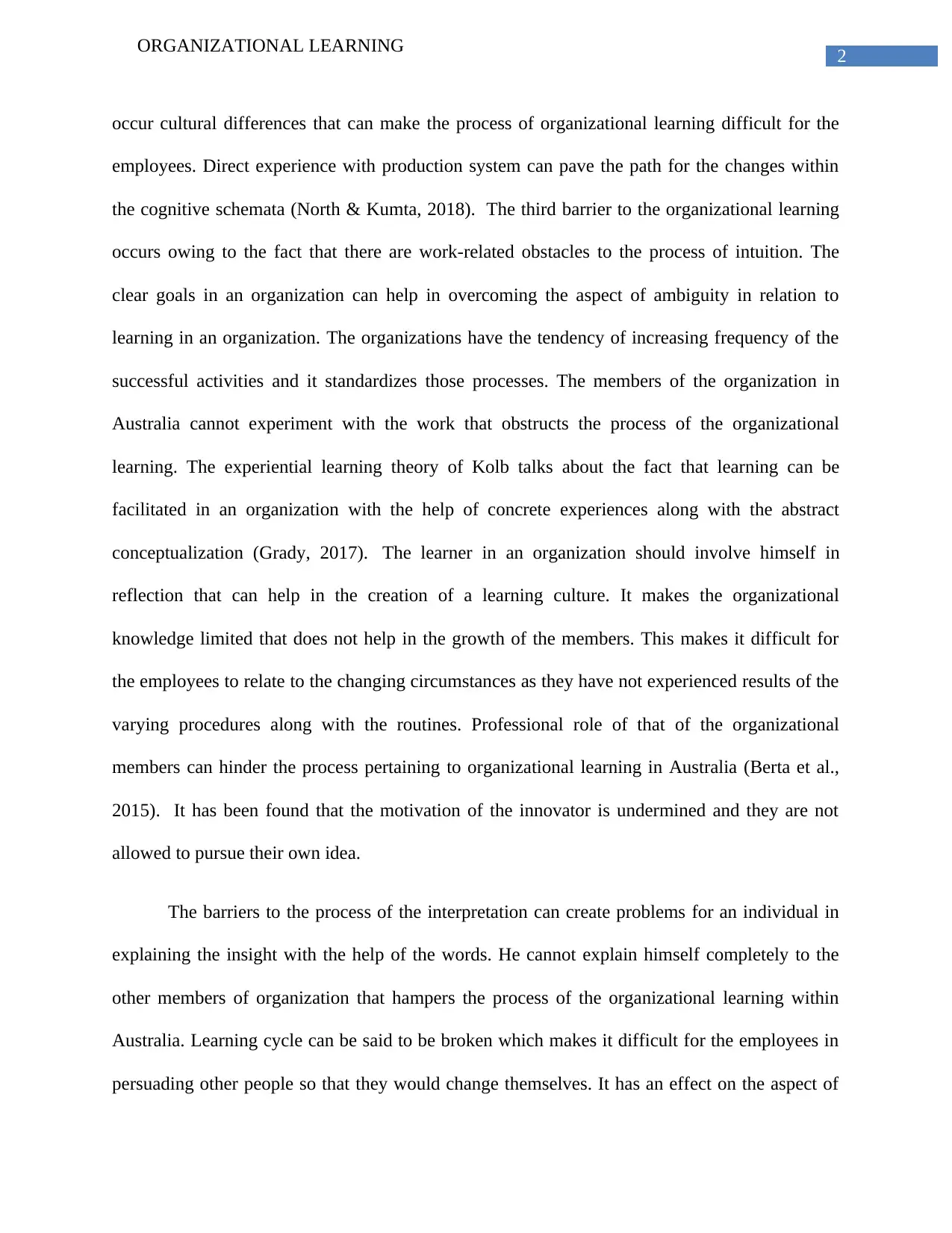
2
ORGANIZATIONAL LEARNING
occur cultural differences that can make the process of organizational learning difficult for the
employees. Direct experience with production system can pave the path for the changes within
the cognitive schemata (North & Kumta, 2018). The third barrier to the organizational learning
occurs owing to the fact that there are work-related obstacles to the process of intuition. The
clear goals in an organization can help in overcoming the aspect of ambiguity in relation to
learning in an organization. The organizations have the tendency of increasing frequency of the
successful activities and it standardizes those processes. The members of the organization in
Australia cannot experiment with the work that obstructs the process of the organizational
learning. The experiential learning theory of Kolb talks about the fact that learning can be
facilitated in an organization with the help of concrete experiences along with the abstract
conceptualization (Grady, 2017). The learner in an organization should involve himself in
reflection that can help in the creation of a learning culture. It makes the organizational
knowledge limited that does not help in the growth of the members. This makes it difficult for
the employees to relate to the changing circumstances as they have not experienced results of the
varying procedures along with the routines. Professional role of that of the organizational
members can hinder the process pertaining to organizational learning in Australia (Berta et al.,
2015). It has been found that the motivation of the innovator is undermined and they are not
allowed to pursue their own idea.
The barriers to the process of the interpretation can create problems for an individual in
explaining the insight with the help of the words. He cannot explain himself completely to the
other members of organization that hampers the process of the organizational learning within
Australia. Learning cycle can be said to be broken which makes it difficult for the employees in
persuading other people so that they would change themselves. It has an effect on the aspect of
ORGANIZATIONAL LEARNING
occur cultural differences that can make the process of organizational learning difficult for the
employees. Direct experience with production system can pave the path for the changes within
the cognitive schemata (North & Kumta, 2018). The third barrier to the organizational learning
occurs owing to the fact that there are work-related obstacles to the process of intuition. The
clear goals in an organization can help in overcoming the aspect of ambiguity in relation to
learning in an organization. The organizations have the tendency of increasing frequency of the
successful activities and it standardizes those processes. The members of the organization in
Australia cannot experiment with the work that obstructs the process of the organizational
learning. The experiential learning theory of Kolb talks about the fact that learning can be
facilitated in an organization with the help of concrete experiences along with the abstract
conceptualization (Grady, 2017). The learner in an organization should involve himself in
reflection that can help in the creation of a learning culture. It makes the organizational
knowledge limited that does not help in the growth of the members. This makes it difficult for
the employees to relate to the changing circumstances as they have not experienced results of the
varying procedures along with the routines. Professional role of that of the organizational
members can hinder the process pertaining to organizational learning in Australia (Berta et al.,
2015). It has been found that the motivation of the innovator is undermined and they are not
allowed to pursue their own idea.
The barriers to the process of the interpretation can create problems for an individual in
explaining the insight with the help of the words. He cannot explain himself completely to the
other members of organization that hampers the process of the organizational learning within
Australia. Learning cycle can be said to be broken which makes it difficult for the employees in
persuading other people so that they would change themselves. It has an effect on the aspect of
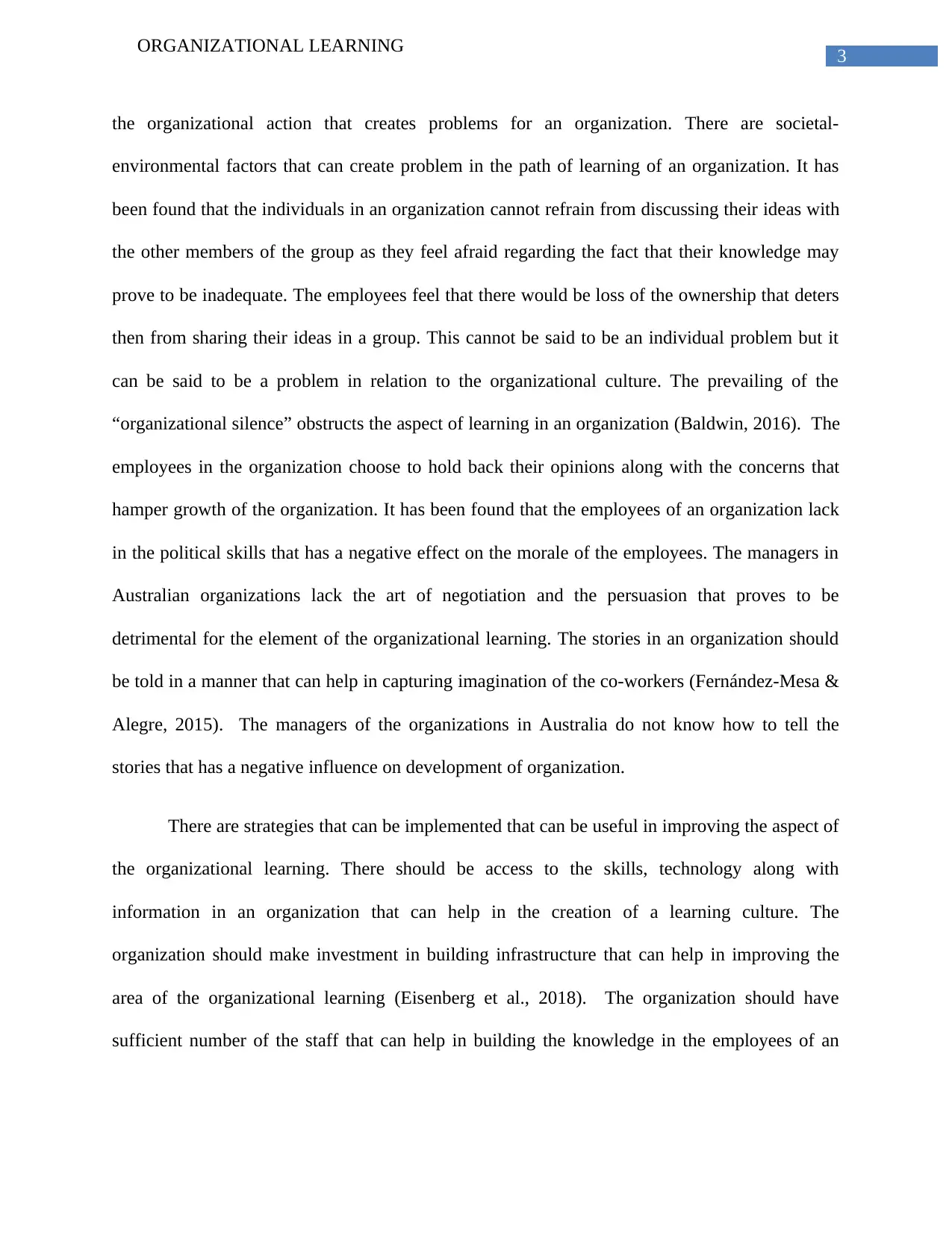
3
ORGANIZATIONAL LEARNING
the organizational action that creates problems for an organization. There are societal-
environmental factors that can create problem in the path of learning of an organization. It has
been found that the individuals in an organization cannot refrain from discussing their ideas with
the other members of the group as they feel afraid regarding the fact that their knowledge may
prove to be inadequate. The employees feel that there would be loss of the ownership that deters
then from sharing their ideas in a group. This cannot be said to be an individual problem but it
can be said to be a problem in relation to the organizational culture. The prevailing of the
“organizational silence” obstructs the aspect of learning in an organization (Baldwin, 2016). The
employees in the organization choose to hold back their opinions along with the concerns that
hamper growth of the organization. It has been found that the employees of an organization lack
in the political skills that has a negative effect on the morale of the employees. The managers in
Australian organizations lack the art of negotiation and the persuasion that proves to be
detrimental for the element of the organizational learning. The stories in an organization should
be told in a manner that can help in capturing imagination of the co-workers (Fernández-Mesa &
Alegre, 2015). The managers of the organizations in Australia do not know how to tell the
stories that has a negative influence on development of organization.
There are strategies that can be implemented that can be useful in improving the aspect of
the organizational learning. There should be access to the skills, technology along with
information in an organization that can help in the creation of a learning culture. The
organization should make investment in building infrastructure that can help in improving the
area of the organizational learning (Eisenberg et al., 2018). The organization should have
sufficient number of the staff that can help in building the knowledge in the employees of an
ORGANIZATIONAL LEARNING
the organizational action that creates problems for an organization. There are societal-
environmental factors that can create problem in the path of learning of an organization. It has
been found that the individuals in an organization cannot refrain from discussing their ideas with
the other members of the group as they feel afraid regarding the fact that their knowledge may
prove to be inadequate. The employees feel that there would be loss of the ownership that deters
then from sharing their ideas in a group. This cannot be said to be an individual problem but it
can be said to be a problem in relation to the organizational culture. The prevailing of the
“organizational silence” obstructs the aspect of learning in an organization (Baldwin, 2016). The
employees in the organization choose to hold back their opinions along with the concerns that
hamper growth of the organization. It has been found that the employees of an organization lack
in the political skills that has a negative effect on the morale of the employees. The managers in
Australian organizations lack the art of negotiation and the persuasion that proves to be
detrimental for the element of the organizational learning. The stories in an organization should
be told in a manner that can help in capturing imagination of the co-workers (Fernández-Mesa &
Alegre, 2015). The managers of the organizations in Australia do not know how to tell the
stories that has a negative influence on development of organization.
There are strategies that can be implemented that can be useful in improving the aspect of
the organizational learning. There should be access to the skills, technology along with
information in an organization that can help in the creation of a learning culture. The
organization should make investment in building infrastructure that can help in improving the
area of the organizational learning (Eisenberg et al., 2018). The organization should have
sufficient number of the staff that can help in building the knowledge in the employees of an
Secure Best Marks with AI Grader
Need help grading? Try our AI Grader for instant feedback on your assignments.
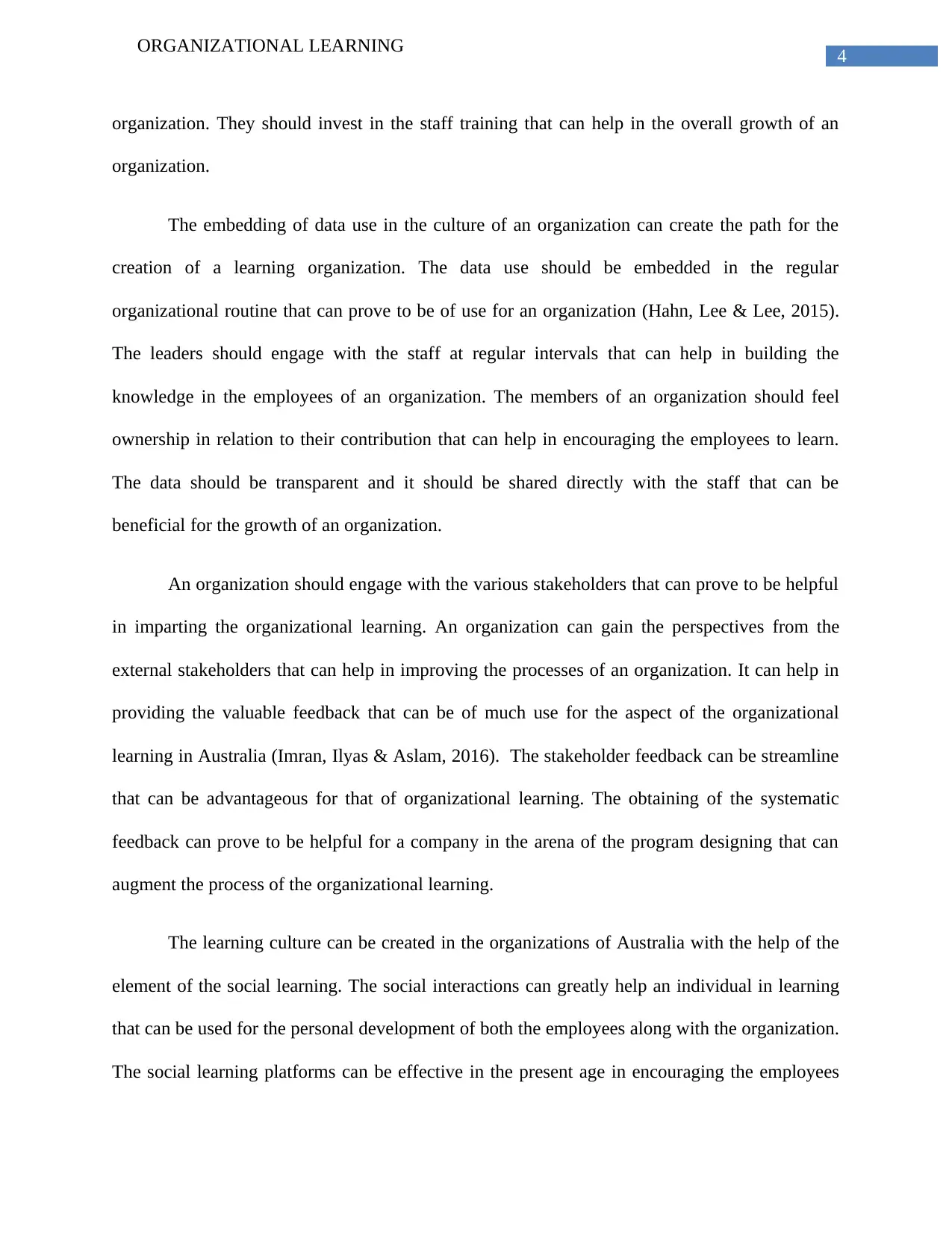
4
ORGANIZATIONAL LEARNING
organization. They should invest in the staff training that can help in the overall growth of an
organization.
The embedding of data use in the culture of an organization can create the path for the
creation of a learning organization. The data use should be embedded in the regular
organizational routine that can prove to be of use for an organization (Hahn, Lee & Lee, 2015).
The leaders should engage with the staff at regular intervals that can help in building the
knowledge in the employees of an organization. The members of an organization should feel
ownership in relation to their contribution that can help in encouraging the employees to learn.
The data should be transparent and it should be shared directly with the staff that can be
beneficial for the growth of an organization.
An organization should engage with the various stakeholders that can prove to be helpful
in imparting the organizational learning. An organization can gain the perspectives from the
external stakeholders that can help in improving the processes of an organization. It can help in
providing the valuable feedback that can be of much use for the aspect of the organizational
learning in Australia (Imran, Ilyas & Aslam, 2016). The stakeholder feedback can be streamline
that can be advantageous for that of organizational learning. The obtaining of the systematic
feedback can prove to be helpful for a company in the arena of the program designing that can
augment the process of the organizational learning.
The learning culture can be created in the organizations of Australia with the help of the
element of the social learning. The social interactions can greatly help an individual in learning
that can be used for the personal development of both the employees along with the organization.
The social learning platforms can be effective in the present age in encouraging the employees
ORGANIZATIONAL LEARNING
organization. They should invest in the staff training that can help in the overall growth of an
organization.
The embedding of data use in the culture of an organization can create the path for the
creation of a learning organization. The data use should be embedded in the regular
organizational routine that can prove to be of use for an organization (Hahn, Lee & Lee, 2015).
The leaders should engage with the staff at regular intervals that can help in building the
knowledge in the employees of an organization. The members of an organization should feel
ownership in relation to their contribution that can help in encouraging the employees to learn.
The data should be transparent and it should be shared directly with the staff that can be
beneficial for the growth of an organization.
An organization should engage with the various stakeholders that can prove to be helpful
in imparting the organizational learning. An organization can gain the perspectives from the
external stakeholders that can help in improving the processes of an organization. It can help in
providing the valuable feedback that can be of much use for the aspect of the organizational
learning in Australia (Imran, Ilyas & Aslam, 2016). The stakeholder feedback can be streamline
that can be advantageous for that of organizational learning. The obtaining of the systematic
feedback can prove to be helpful for a company in the arena of the program designing that can
augment the process of the organizational learning.
The learning culture can be created in the organizations of Australia with the help of the
element of the social learning. The social interactions can greatly help an individual in learning
that can be used for the personal development of both the employees along with the organization.
The social learning platforms can be effective in the present age in encouraging the employees
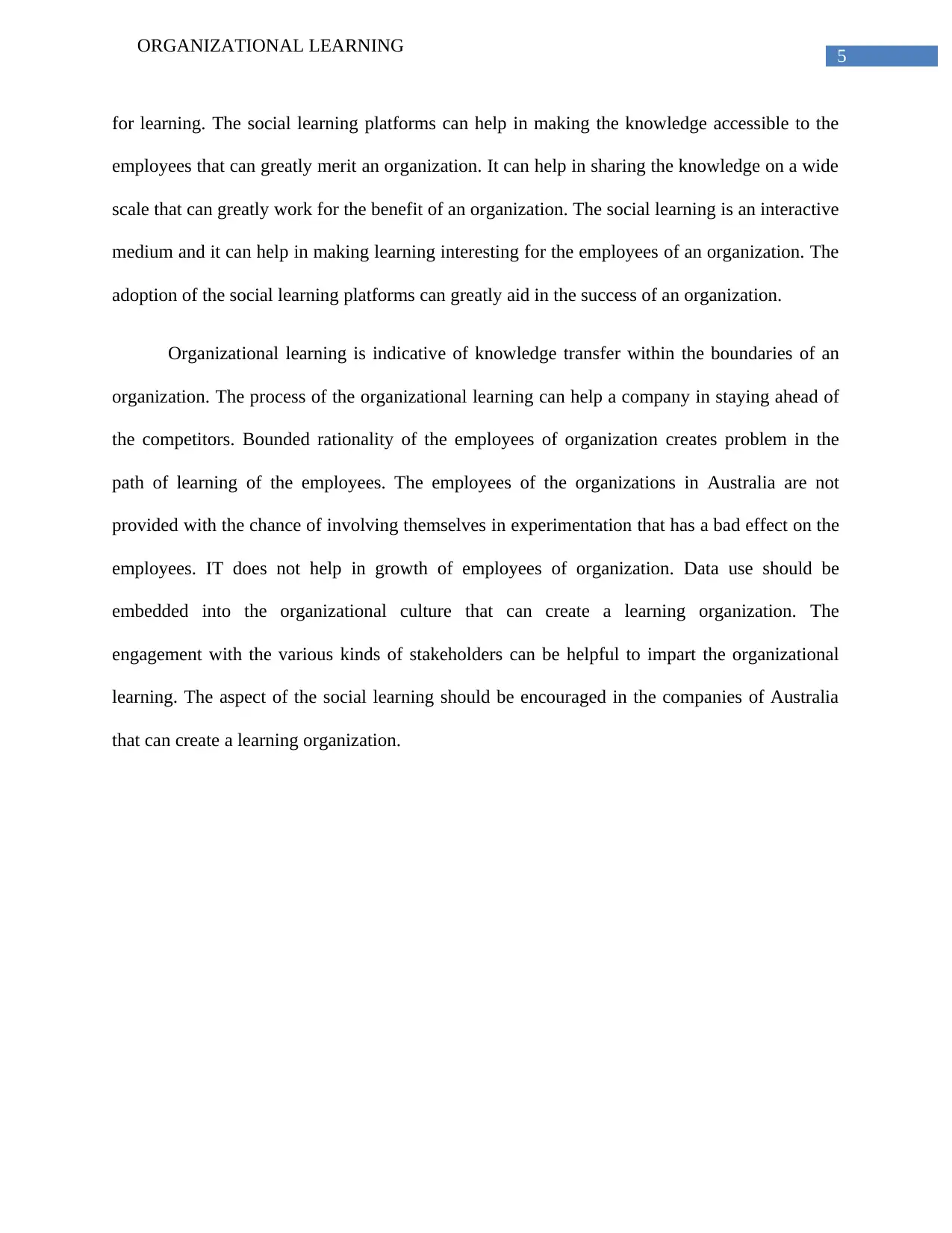
5
ORGANIZATIONAL LEARNING
for learning. The social learning platforms can help in making the knowledge accessible to the
employees that can greatly merit an organization. It can help in sharing the knowledge on a wide
scale that can greatly work for the benefit of an organization. The social learning is an interactive
medium and it can help in making learning interesting for the employees of an organization. The
adoption of the social learning platforms can greatly aid in the success of an organization.
Organizational learning is indicative of knowledge transfer within the boundaries of an
organization. The process of the organizational learning can help a company in staying ahead of
the competitors. Bounded rationality of the employees of organization creates problem in the
path of learning of the employees. The employees of the organizations in Australia are not
provided with the chance of involving themselves in experimentation that has a bad effect on the
employees. IT does not help in growth of employees of organization. Data use should be
embedded into the organizational culture that can create a learning organization. The
engagement with the various kinds of stakeholders can be helpful to impart the organizational
learning. The aspect of the social learning should be encouraged in the companies of Australia
that can create a learning organization.
ORGANIZATIONAL LEARNING
for learning. The social learning platforms can help in making the knowledge accessible to the
employees that can greatly merit an organization. It can help in sharing the knowledge on a wide
scale that can greatly work for the benefit of an organization. The social learning is an interactive
medium and it can help in making learning interesting for the employees of an organization. The
adoption of the social learning platforms can greatly aid in the success of an organization.
Organizational learning is indicative of knowledge transfer within the boundaries of an
organization. The process of the organizational learning can help a company in staying ahead of
the competitors. Bounded rationality of the employees of organization creates problem in the
path of learning of the employees. The employees of the organizations in Australia are not
provided with the chance of involving themselves in experimentation that has a bad effect on the
employees. IT does not help in growth of employees of organization. Data use should be
embedded into the organizational culture that can create a learning organization. The
engagement with the various kinds of stakeholders can be helpful to impart the organizational
learning. The aspect of the social learning should be encouraged in the companies of Australia
that can create a learning organization.
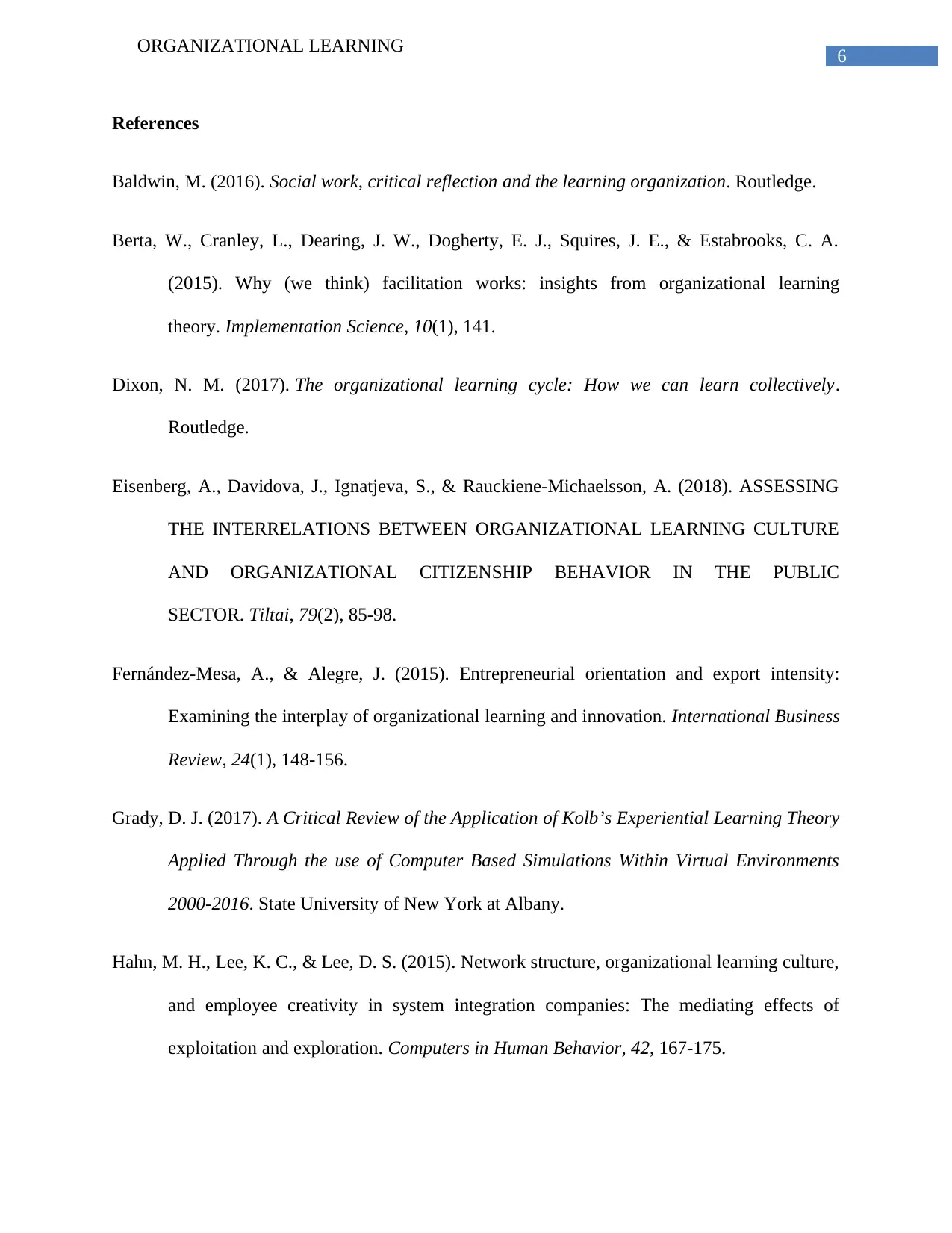
6
ORGANIZATIONAL LEARNING
References
Baldwin, M. (2016). Social work, critical reflection and the learning organization. Routledge.
Berta, W., Cranley, L., Dearing, J. W., Dogherty, E. J., Squires, J. E., & Estabrooks, C. A.
(2015). Why (we think) facilitation works: insights from organizational learning
theory. Implementation Science, 10(1), 141.
Dixon, N. M. (2017). The organizational learning cycle: How we can learn collectively.
Routledge.
Eisenberg, A., Davidova, J., Ignatjeva, S., & Rauckiene-Michaelsson, A. (2018). ASSESSING
THE INTERRELATIONS BETWEEN ORGANIZATIONAL LEARNING CULTURE
AND ORGANIZATIONAL CITIZENSHIP BEHAVIOR IN THE PUBLIC
SECTOR. Tiltai, 79(2), 85-98.
Fernández-Mesa, A., & Alegre, J. (2015). Entrepreneurial orientation and export intensity:
Examining the interplay of organizational learning and innovation. International Business
Review, 24(1), 148-156.
Grady, D. J. (2017). A Critical Review of the Application of Kolb’s Experiential Learning Theory
Applied Through the use of Computer Based Simulations Within Virtual Environments
2000-2016. State University of New York at Albany.
Hahn, M. H., Lee, K. C., & Lee, D. S. (2015). Network structure, organizational learning culture,
and employee creativity in system integration companies: The mediating effects of
exploitation and exploration. Computers in Human Behavior, 42, 167-175.
ORGANIZATIONAL LEARNING
References
Baldwin, M. (2016). Social work, critical reflection and the learning organization. Routledge.
Berta, W., Cranley, L., Dearing, J. W., Dogherty, E. J., Squires, J. E., & Estabrooks, C. A.
(2015). Why (we think) facilitation works: insights from organizational learning
theory. Implementation Science, 10(1), 141.
Dixon, N. M. (2017). The organizational learning cycle: How we can learn collectively.
Routledge.
Eisenberg, A., Davidova, J., Ignatjeva, S., & Rauckiene-Michaelsson, A. (2018). ASSESSING
THE INTERRELATIONS BETWEEN ORGANIZATIONAL LEARNING CULTURE
AND ORGANIZATIONAL CITIZENSHIP BEHAVIOR IN THE PUBLIC
SECTOR. Tiltai, 79(2), 85-98.
Fernández-Mesa, A., & Alegre, J. (2015). Entrepreneurial orientation and export intensity:
Examining the interplay of organizational learning and innovation. International Business
Review, 24(1), 148-156.
Grady, D. J. (2017). A Critical Review of the Application of Kolb’s Experiential Learning Theory
Applied Through the use of Computer Based Simulations Within Virtual Environments
2000-2016. State University of New York at Albany.
Hahn, M. H., Lee, K. C., & Lee, D. S. (2015). Network structure, organizational learning culture,
and employee creativity in system integration companies: The mediating effects of
exploitation and exploration. Computers in Human Behavior, 42, 167-175.
Paraphrase This Document
Need a fresh take? Get an instant paraphrase of this document with our AI Paraphraser
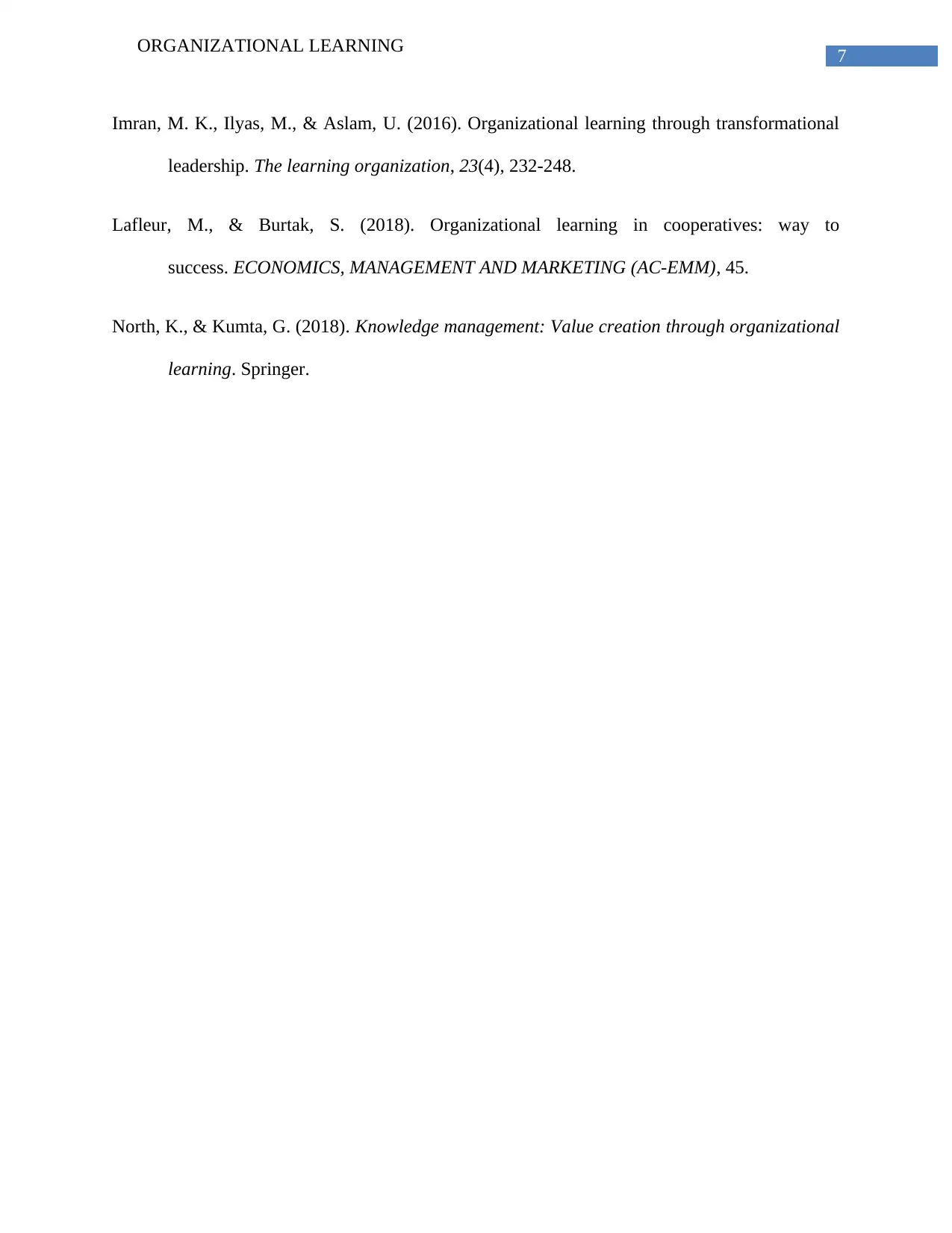
7
ORGANIZATIONAL LEARNING
Imran, M. K., Ilyas, M., & Aslam, U. (2016). Organizational learning through transformational
leadership. The learning organization, 23(4), 232-248.
Lafleur, M., & Burtak, S. (2018). Organizational learning in cooperatives: way to
success. ECONOMICS, MANAGEMENT AND MARKETING (AC-EMM), 45.
North, K., & Kumta, G. (2018). Knowledge management: Value creation through organizational
learning. Springer.
ORGANIZATIONAL LEARNING
Imran, M. K., Ilyas, M., & Aslam, U. (2016). Organizational learning through transformational
leadership. The learning organization, 23(4), 232-248.
Lafleur, M., & Burtak, S. (2018). Organizational learning in cooperatives: way to
success. ECONOMICS, MANAGEMENT AND MARKETING (AC-EMM), 45.
North, K., & Kumta, G. (2018). Knowledge management: Value creation through organizational
learning. Springer.
1 out of 8
Related Documents
Your All-in-One AI-Powered Toolkit for Academic Success.
+13062052269
info@desklib.com
Available 24*7 on WhatsApp / Email
![[object Object]](/_next/static/media/star-bottom.7253800d.svg)
Unlock your academic potential
© 2024 | Zucol Services PVT LTD | All rights reserved.




